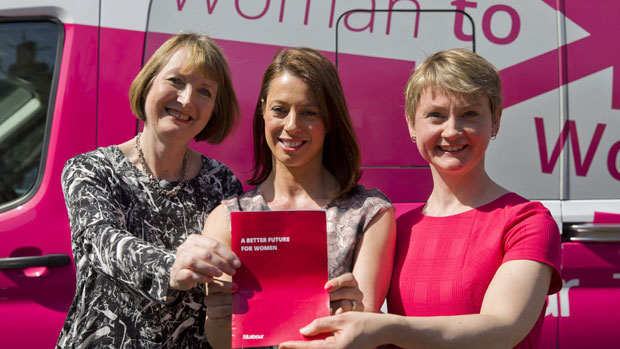The 'women's vote': how each party is fighting for it
Is is sexist to talk of 'the women's vote', and do women really vote that differently to men?

A free daily email with the biggest news stories of the day – and the best features from TheWeek.com
You are now subscribed
Your newsletter sign-up was successful
In the tightest and most unpredictable election in recent years, politicians continue to fight for the crucial "women's vote".
Both Ed Miliband and David Cameron have been criticised for having a "women problem" and each is making a concerted effort to appeal to the female half of the electorate. But some commentators say we should stop referring to the women's vote at all.
Is the idea of 'the women's vote' sexist?
The Week
Escape your echo chamber. Get the facts behind the news, plus analysis from multiple perspectives.

Sign up for The Week's Free Newsletters
From our morning news briefing to a weekly Good News Newsletter, get the best of The Week delivered directly to your inbox.
From our morning news briefing to a weekly Good News Newsletter, get the best of The Week delivered directly to your inbox.
With women making up 52 per cent of the British electorate, some consider the term to be patronising, outdated and offensive. "No-one, after all, talks about 'the men's vote'" says the BBC's Vanessa Barford. The language used by politicians and the media during campaigning is often sexist and problematic says David Jarvis, a historian at University of Cambridge. "Phrases like 'wooing' or 'courting' women, romantic language, the type of language girls' mothers warn their children that bad men will seduce vulnerable women with, is regularly employed," he said.
Politicians should stop thinking the female half of the electorate "consists of a volatile and incomprehensible tribe of aliens that mysteriously lands on British soil once every five years, just in time for a general election," says the Daily Telegraph's Jane Shilling.
Do women vote differently than men?
"If you ask people whether something is important, you don't see much difference between men and women," said Dr Rosie Campbell, a gender and politics expert at Birkbeck University of London. "But if you ask them to identify the most important issue facing Britain, women are more likely to say health and education, whereas men are more likely to say taxation, the economy and Europe." Other voting patterns have emerged, with women slightly more likely to vote for the Tories over Labour. Experts have said that if women hadn't been given the vote, Labour would have won every election from 1945 to 1979, the BBC reports. Women are also more likely to vote for the Green Party while more men vote for Ukip, the SNP and BNP. Polls show women leave it longer to decide who they are going to vote for, with one survey suggesting that women are twice as likely as men to be undecided voters. "That makes women prime fodder for politicians in the final countdown to an election," says Barford.
A free daily email with the biggest news stories of the day – and the best features from TheWeek.com
How have the parties targeted women in their manifestos?
The Conservatives have pledged to introduce a new system of flexible parental leave, so parents can decide how to divide paid maternity leave between them. Cameron has also promised to deliver a new strategy to tackle violence against women, including a greater focus on preventative work in schools, better training for police and front-line professionals. After promising to "bring politics to the school gate and the shopping centre" in its pink bus, Labour has unveiled its pink manifesto for women. It says it will put tackling violence against women at the heart of its government and plans to shame large companies by forcing them to publish the "hourly pay gap" between the sexes. The Liberal Democrats have promised to extend free childcare to all two-year-olds for working families and has committed to 20 hours free childcare a week for parents with children aged two to four. They also plan to "reform and simplify" equal pay and sex discrimination legislation "to bring it closer to reality". In its unusually woman-friendly manifesto, Ukip has promised to put a stop to the tampon tax – by leaving the EU. "No other party can pledge to take this simple step," Suzanne Evans, the party's head of policies, said in a statement. The Green Party has long pledged to protect women's rights, with MP Caroline Lucas campaigning for equal pay and equal representation in parliament. Ahead of the election, the party has promised to ensure that that rape crisis centres and domestic violence centres receive guaranteed funding.
The SNP is committed to raising free childcare from 16 to 30 hours per week and has also promised action to increase the representation of women on company boards and in parliament. "Smashing the gender glass ceiling to smithereens is an important part of making progress," said Nicola Sturgeon.